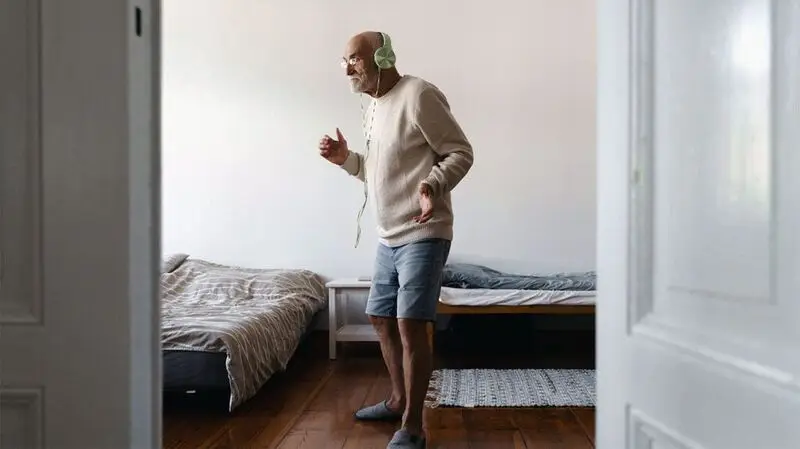
- Vision problems can be an early sign of Alzheimer’s disease.
- Researchers from Loughborough University in the United Kingdom argue that a loss of visual sensitivity can predict Alzheimer’s disease 12 years before diagnosis.
- Scientists suggest combining visual processing tests with other neuropsychological tests to potentially improve the identification of future dementia risk.
Previous studies have shown that physical changes to the eyes, such as
Additionally, researchers have found
Now, researchers from Loughborough University in the United Kingdom argue that a loss of visual sensitivity could predict Alzheimer’s disease 12 years before typical diagnosis.
The scientists present their findings in a paper published in
For this study, researchers used data from more than 8,000 healthy adults who participated in the EPIC-Norfolk Prospective Population Cohort Study.
These study participants had undertaken visual sensitivity testing, which researchers state assesses a person’s visual processing speed and reaction time.
The computerized test asked participants to hit the keyboard space bar when they saw a triangle forming in a field of moving dots on the screen.
“Visual sensitivity refers to an individual’s ability to detect and process visual information accurately and efficiently,” Ahmet Begde, a doctoral researcher in the School of Sport, Exercise, and Health Sciences at Loughborough University in the U.K., and one of the researchers of this study explained to Medical News Today.
“A loss of visual sensitivity can lead to various difficulties in perceiving and processing visual information, such as difficulty recognizing objects or faces, struggles with reading or navigating in familiar environments, and challenges in perceiving visual details or contrasts,“ he explained. “For example, a person with reduced visual sensitivity may have difficulty reading street signs while driving.”
“We decided to investigate visual sensitivity as a predictor of dementia because previous research has shown that individuals with dementia often experience visual processing deficits, even in the early stages of the condition,” Begde continued.
“Visual impairments have been linked to an increased risk of future dementia development, suggesting that assessing visual processing abilities could be a valuable tool in dementia risk assessment,” he added.
Through their research, the scientists found that study participants with lower scores on the visual sensitivity test had a higher risk of a future dementia diagnosis.
Prof. Eef Hogervorst, PhD, chair of Biological Psychology and director of Dementia Research at Loughborough University, and lead author of this study, told MNT:
“We found that a low score on this test missing many targets can indicate future dementia risk, on average 12 years before the diagnosis, especially when using this test with other specific memory tests and some tests of global cognitive functioning worked well to predict this risk.”
“We aim to explore the potential of combining visual sensitivity assessments with other cognitive and neuropsychological tests to improve the accuracy of dementia risk prediction,” Begde said. “Additionally, we intend to investigate the potential of visual sensitivity tests as a tool for monitoring response to interventions, such as exercise.”
“Furthermore, we want to examine if our visual sensitivity test can predict driving skills in people with dementia,” he added. “We are conducting an experimental study to investigate this aspect, as driving requires robust visual processing abilities which may be compromised in individuals at risk for or diagnosed with dementia.”
After reviewing this research, Alexander Solomon, MD, a surgical neuro-ophthalmologist and strabismus surgeon at Pacific Neuroscience Institute in Santa Monica, CA, not involved in this research, told MNT the results of the study are unsurprising and consistent with what he sees on a day-to-day basis in his clinic.
“Although most people’s first thought when it comes to vision is understandably our eyes, this portion of our vision is primarily devoted to focusing and detecting light from the environment with only a limited amount of processing,” Solomon explained.
“The brain takes these light signals and has to turn them into a cohesive image to understand, including identifying elements such as color, movement, and both object and facial recognition,” he pointed out.
“It isn’t hard to imagine that as the brain is compromised by a process like dementia, some portions that help process our vision are affected. This results in the loss of visual sensitivity — in this case, measured by processing speed and reaction time to a stimulus on either a blank or crowded background.”
– Alexander Solomon, MD
Solomon said he would like to see more clinical-driven characteristics correlated to the visual sensitivity testing results.
“For example, dementia is a broad category, and it would be good to see if specific types of dementia correlate more to decreased scores,” he detailed.
“Similarly, [the study authors] were relying on whether dementia was simply listed as a diagnosis on hospital inpatient records to state if a patient developed it, and having an actual clinician verifying and characterizing the diagnosis could be helpful to catch subtle cases and verify borderline ones,” Solomon cautioned.
MNT also spoke with Clifford Segil, DO, a neurologist at Providence Saint John’s Health Center in Santa Monica, CA, not involved in this study, commented that people who cannot see a triangle forming in a field of dots should see an eye doctor before seeing a brain doctor.
“Elderly patients with vision and hearing problems are frequently evaluated for dementia” where appropriate anyway, Segil said. Nevertheless, he noted that such issues are not always consistent with signs of cognitive decline.
“Patients with hearing loss often ask people to repeat themselves, which may be due to hearing loss more than dementia,“ noted Segil.
Similarly, “[p]atients [with] vision complaints often have issues recognizing people and faces, and sometimes this may be resolved with glasses or corrective surgeries,” he pointed out.
“This study noted out of 8,623 ‘healthy people’ about 6% (587) patients developed dementia,” he continued. “I would like to see some type of eye exam done on the 6% of these patients who developed dementia to make sure there was nothing wrong in front of their optic nerve or in their eyes,” Segil told us.





